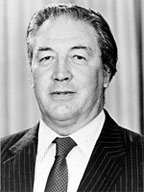Difference between revisions of "John Jones"
Tom Griffin (talk | contribs) (→External Resources) |
Tom Griffin (talk | contribs) (→F Branch Chief) |
||
| Line 5: | Line 5: | ||
==F Branch Chief== | ==F Branch Chief== | ||
| − | Jones headed MI5's [[MI5 F Branch|F Branch]] from 1972 to 1974.<ref>Christopher Andrew, Defence of the Realm, The Authorized History of MI5, Allen Lane, 2009, p.621.</ref> According to | + | Jones headed MI5's [[MI5 F Branch|F Branch]] from 1972 to 1974.<ref>Christopher Andrew, Defence of the Realm, The Authorized History of MI5, Allen Lane, 2009, p.621.</ref> According to David Leigh, officers with a background on 'the industrial desk' such as Jones, '[[David Ranson|David Ransome]]' and [[John Woodruffe]], came to prominence in the early 1970s, because of Director [[Michael Hanley]]'s prioritisation of counter-subversion.<ref>David Leigh, The Wilson Plot, Mandarin, 1989, p.209.</ref> |
| − | in 1972, he defined subversion as "activities threatening the safety of well-being of the State and intended to undermine or overthrow Parliamentary democracy by political, industrial or violent means."<ref>Christopher Andrew, Defence of the Realm, The Authorized History of MI5, Allen Lane, 2009, p.591.</ref> | + | According to Christopher Andrew, Jones concentrated on F Branch's counter-subversion role, paying little attention to the counter-terrorism part of its brief.<ref>Christopher Andrew, Defence of the Realm, The Authorized History of MI5, Allen Lane, 2009, p.616.</ref> |
| + | |||
| + | in 1972, he defined subversion as "activities threatening the safety of well-being of the State and intended to undermine or overthrow Parliamentary democracy by political, industrial or violent means."<ref>Christopher Andrew, Defence of the Realm, The Authorized History of MI5, Allen Lane, 2009, p.591.</ref> | ||
==Deputy Director General== | ==Deputy Director General== | ||
Revision as of 23:16, 10 April 2015
Sir John Jones was head of the British Security Service (MI5) from 1981 to 1985.[1]
Jones served as an officer in the Royal Artillery and a civil servant in pre-independence Sudan before joining the Security Service in 1955.[2]
F Branch Chief
Jones headed MI5's F Branch from 1972 to 1974.[3] According to David Leigh, officers with a background on 'the industrial desk' such as Jones, 'David Ransome' and John Woodruffe, came to prominence in the early 1970s, because of Director Michael Hanley's prioritisation of counter-subversion.[4]
According to Christopher Andrew, Jones concentrated on F Branch's counter-subversion role, paying little attention to the counter-terrorism part of its brief.[5]
in 1972, he defined subversion as "activities threatening the safety of well-being of the State and intended to undermine or overthrow Parliamentary democracy by political, industrial or violent means."[6]
Deputy Director General
Jones became Deputy Director General in 1976.[7]
Director General
Jones became Director General in 1981.[8]
According to Stephen Dorril, Jones' position was weakened by the Geoffrey Prime case:
- Internally, MI5 appears to have been split between Jones's supporters, who came primarily from F Branch, and an opposition made up of the old guard of K Branch, who regarded their work as more important, and the younger officers, who had difficulty accepting the political role which the service, with its increased concentration on subversion, was expected to undertake.[9]
External Resources
- Namebase: Jones John Lewis
- Tom Griffin, The boys from Berlin: The MI5 officers who covered up Kincora, Spinwatch, 12 August 2014.
Notes
- ↑ Former Directors General, MI5, accessed 30 June 2009.
- ↑ Former Directors General, MI5, accessed 30 June 2009.
- ↑ Christopher Andrew, Defence of the Realm, The Authorized History of MI5, Allen Lane, 2009, p.621.
- ↑ David Leigh, The Wilson Plot, Mandarin, 1989, p.209.
- ↑ Christopher Andrew, Defence of the Realm, The Authorized History of MI5, Allen Lane, 2009, p.616.
- ↑ Christopher Andrew, Defence of the Realm, The Authorized History of MI5, Allen Lane, 2009, p.591.
- ↑ Former Directors General, MI5, accessed 30 June 2009.
- ↑ Former Directors General, MI5, accessed 30 June 2009.
- ↑ Stephen Dorril, The Silent Conspiracy: Inside the Intelligence Services in the 1990s, Mandarin, 1994, p.486.
